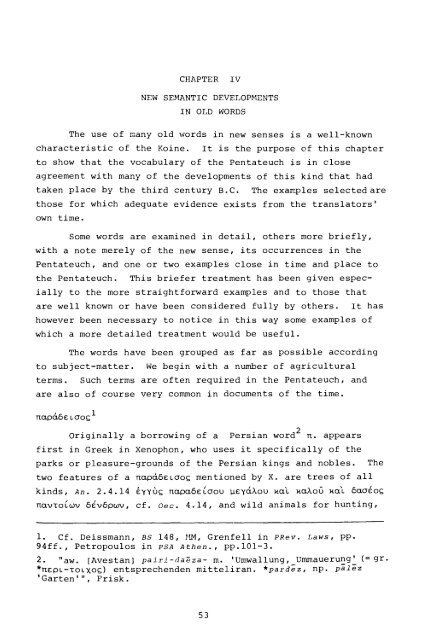A Lexical Study of the Septuagint Version of the Pentateuch
A Lexical Study of the Septuagint Version of the Pentateuch
A Lexical Study of the Septuagint Version of the Pentateuch
Create successful ePaper yourself
Turn your PDF publications into a flip-book with our unique Google optimized e-Paper software.
CHAPTER IV<br />
NEW SEMANTIC DEVELOPMENTS<br />
IN OLD WORDS<br />
The use <strong>of</strong> many old words in new senses is a well-known<br />
characteristic <strong>of</strong> <strong>the</strong> Koine. It is <strong>the</strong> purpose <strong>of</strong> this chapter<br />
to show that <strong>the</strong> vocabulary <strong>of</strong> <strong>the</strong> <strong>Pentateuch</strong> is in close<br />
agreement with many <strong>of</strong> <strong>the</strong> developments <strong>of</strong> this kind that had<br />
taken place by <strong>the</strong> third century B.C. The examples selected are<br />
those for which adequate evidence exists from <strong>the</strong> translators'<br />
own time.<br />
Some words are examined in detail, o<strong>the</strong>rs more briefly,<br />
with a note merely <strong>of</strong> <strong>the</strong> new sense, its occurrences in <strong>the</strong><br />
<strong>Pentateuch</strong>, and one or two examples close in time and place to<br />
<strong>the</strong> <strong>Pentateuch</strong>. This briefer treatment has been given espec<br />
ially to <strong>the</strong> more straightforward examples and to those that<br />
are well known or have been considered fully by o<strong>the</strong>rs. It has<br />
however been necessary to notice in this way some examples <strong>of</strong><br />
which a more detailed treatment would be useful.<br />
The words have been grouped as far as possible according<br />
to subject-matter. We begin with a number <strong>of</strong> agricultural<br />
terms. Such terms are <strong>of</strong>ten required in <strong>the</strong> <strong>Pentateuch</strong>, and<br />
are also <strong>of</strong> course very common in documents <strong>of</strong> <strong>the</strong> time.<br />
παράδείσος 1<br />
Originally a borrowing <strong>of</strong> a Persian word π. appears<br />
first in Greek in Xenophon, who uses it specifically <strong>of</strong> <strong>the</strong><br />
parks or pleasure-grounds <strong>of</strong> <strong>the</strong> Persian kings and nobles. The<br />
two features <strong>of</strong> a παράδεισος mentioned by X. are trees <strong>of</strong> all<br />
kinds, An. 2.4.14 εγγύς παραδείσου μεγάλου και καλού και δασέος<br />
παντοίων δένδρων, cf. Oec. 4.14, and wild animals for hunting,<br />
1. Cf. Deissmann, BS 148, MM, Grenfell in PRev. Laws, pp.<br />
94ff., Petropoulos in PSA A<strong>the</strong>n., pp.101-3.<br />
2. "aw. [Avestan] pairi-daëza- m. 'Umwallung, Ummauerung' (= gr.<br />
*περι-τοιχος) entsprechenden mitteliran. *pardez, np. pâlëz<br />
'Garten'", Frisk.<br />
2

















